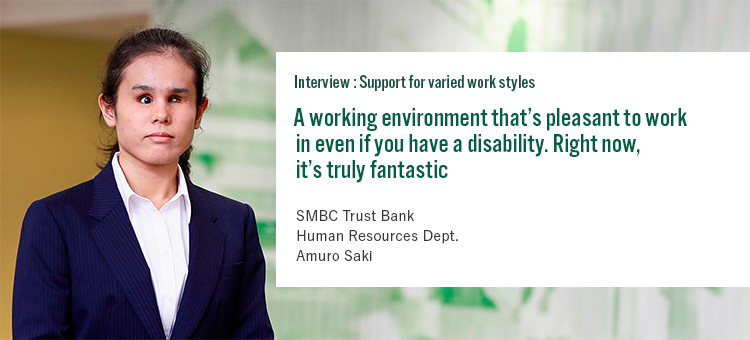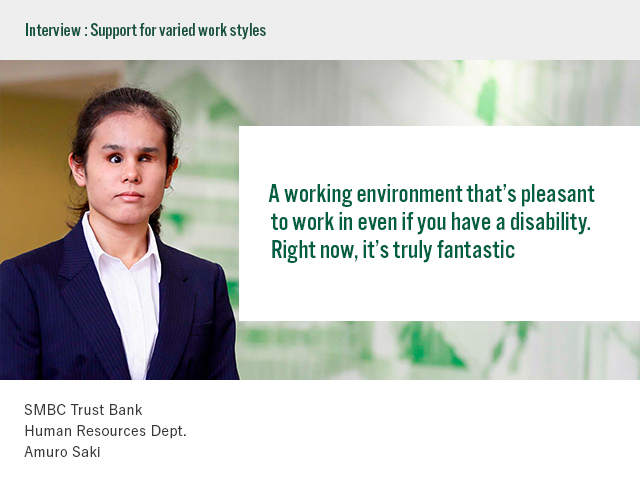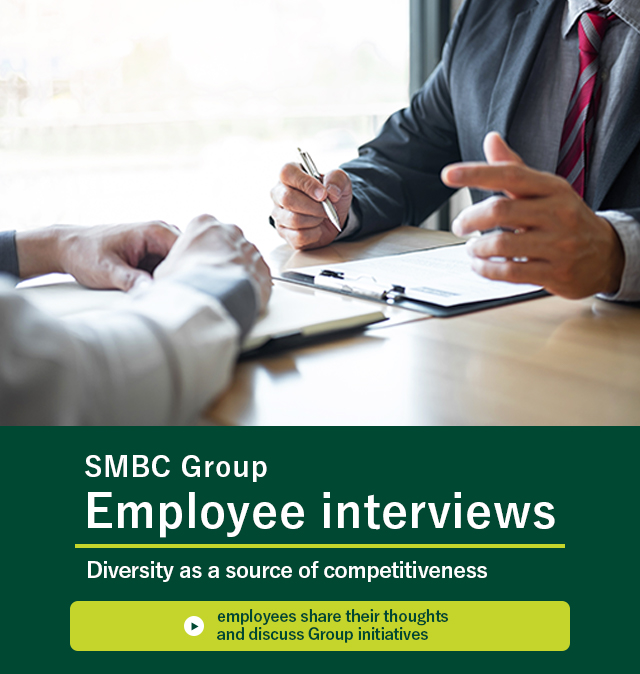Note:Departments and posts are as of the time of the interview(October 2019)
Related categories
The wish of SMBC Group is to create a corporate climate in which people from various backgrounds respect each other and can give full play to their capabilities and their individuality. As a result, new value is created to further contribute to our customers. This commitment lies at the heart of our growth strategy. Here we meet an employee who is both a healthkeeper (in-house therapist) and a para-athlete. She’s able to thrive as she leverages her abilities and attributes.
Putting a qualification obtained at college to use by working as a healthkeeper
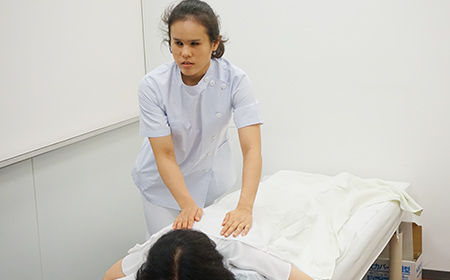
“My occupation is healthkeeper. Another word for the job is in-house therapist, and I provide employees with massage therapy to relieve their fatigue and stress, helping them to tackle their work in peak condition. I obtained the required qualification from the department of acupuncture and moxibustion therapy at Tsukuba University’s Special Needs Education School for the Visually Impaired. I’m working as the first female healthkeeper ever at my current workplace, an office in Higashi-Shinjuku. So it’s possible to meet the needs of female employees more so than before, and every time I feel that I’m needed by so many employees, I feel glad that I took this job.
Each massage lasts 30 minutes. When I first joined the company, I was a bit anxious about how to allocate time, but I’ve got used to things now, and on a busy day I give massages to about five people. Everyone tells me what’s bothering them, but the most common complaint is stiff shoulders. It seems that the more time you spend at a desk looking at a computer, the stiffer your shoulders get. I want to relieve the symptoms of as many people as possible, so that they will be able to tackle their work in a better condition.
I’m also active as a para-athlete, as I’m a goalball player. One person got interested in goalball and came to watch me play after I talked to them about it during their massage. Later, even after they’d been transferred elsewhere, they sent me an email saying, “I saw the tournament results.” I was so happy. Meeting all sorts of people like this is also one of the joys of the job.”
Realizing the “importance of working” as I aimed for a medal in goalball
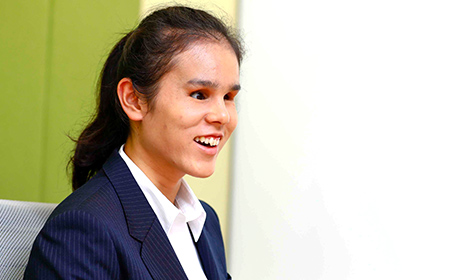
“I lost my sight in both eyes when I was one year old as a result of an illness. I was born in Okinawa, but decided that I wanted to live in Tokyo at least once in my life, so for high school I entered Tsukuba University’s Special Needs Education School for the Visually Impaired, which is in Bunkyo ward. It was there that I discovered the sport of goalball.
Goalball is a sport for people with visual impairments. There are three players on each team, and they all wear eyeshades (blindfolds). Because our eyes are covered, we have to rely on sound alone. The court is enveloped in silence, and we depend on our ears to gauge the movement of the ball as we fiercely attack and defend against the opposing team. Because we can’t use vision to track the position and movements of the players or the ball, coordinated play with our teammates is vital, as is sharpening our sensory acuity. Multiple players all move in unison, the other team doesn’t know who is going to throw the ball. And we try to pass it without making a sound. Techniques like this make it difficult to judge where the ball is, and are what makes the sport so thrilling.
After graduating from college, I was called up to the Japan national team for goalball, and I began thinking that I’d someday like to play and have a successful run in the Paralympics. But just at that time, the Japan team coach said: “It’s important for you to work (not just play goalball).” He went on to say, “Your time as an athlete will not be a particularly long period in your life. Make sure to think about what you’ll do after you retire from sport.” That advice has stayed with me ever since.”
Blessed with my ideal way of working
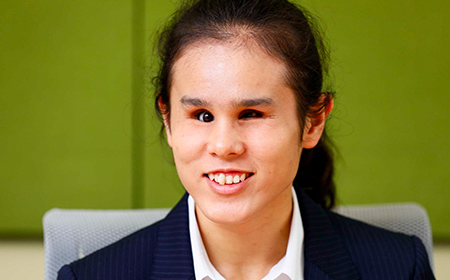
“After receiving that advice from the coach, I started looking for a company that would allow me both to work every day and to pursue sport. And it’s this company that made that dream come true. I’m an employee of the company, and I regard work as work, and want to do the best I can at it, while also striving to live as an athlete. And with this approach, I think it’s easy to gain support from colleagues. As my coach said, it’s impossible to remain an athlete forever, so I also want to think about what lies beyond, and to continue to put to use my license as an acupuncturist and practitioner of moxibustion, which I received from the national government and worked so hard to get.
To be honest, the grueling practice I perform every day makes me tired. The toughest periods are the tours, camps, and tournaments. Unless I’m in tip-top condition, I won’t be able to give good massages to the employees. So for example, I arrange my work schedule so that I can take a day off on the day after returning from a tour, when I’m especially tired. Every day I work really hard from the morning, and I’m very satisfied with my life now, as I can balance both my sport and my work.”
SMBC Group is endeavoring to develop various work processes and create environments that are pleasant to work in so that employees with disabilities can each give full play to their respective abilities and attributes. Each company has set a target for the percentage of employees with disabilities that is higher than the legal requirement. And by hiring or sponsoring para-athletes, organizing lectures by para-athletes, and helping them take part in tournaments both in Japan and abroad, we are focusing on activities that serve to deepen understanding of people with disabilities.
Daily schedule
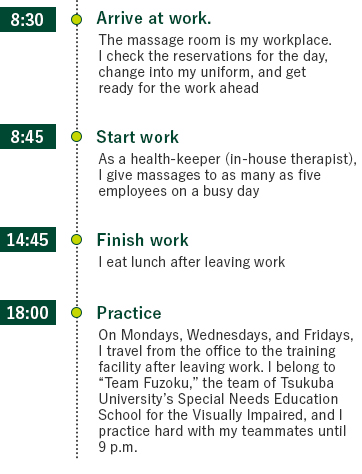
Special memory
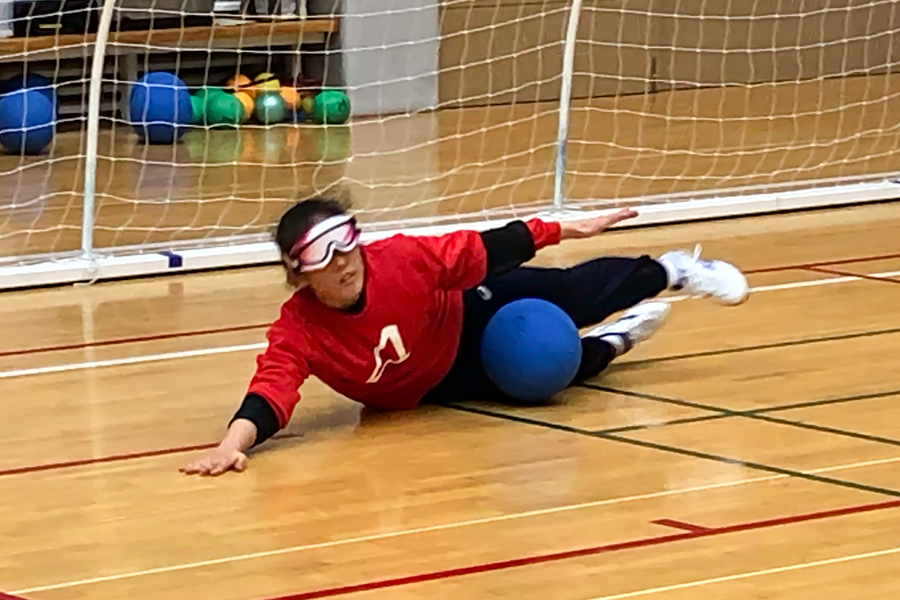
Scene at practice

“When traveling overseas to an international tournament, I always buy a souvenir keychain from the country to serve as a memento of my visit”
